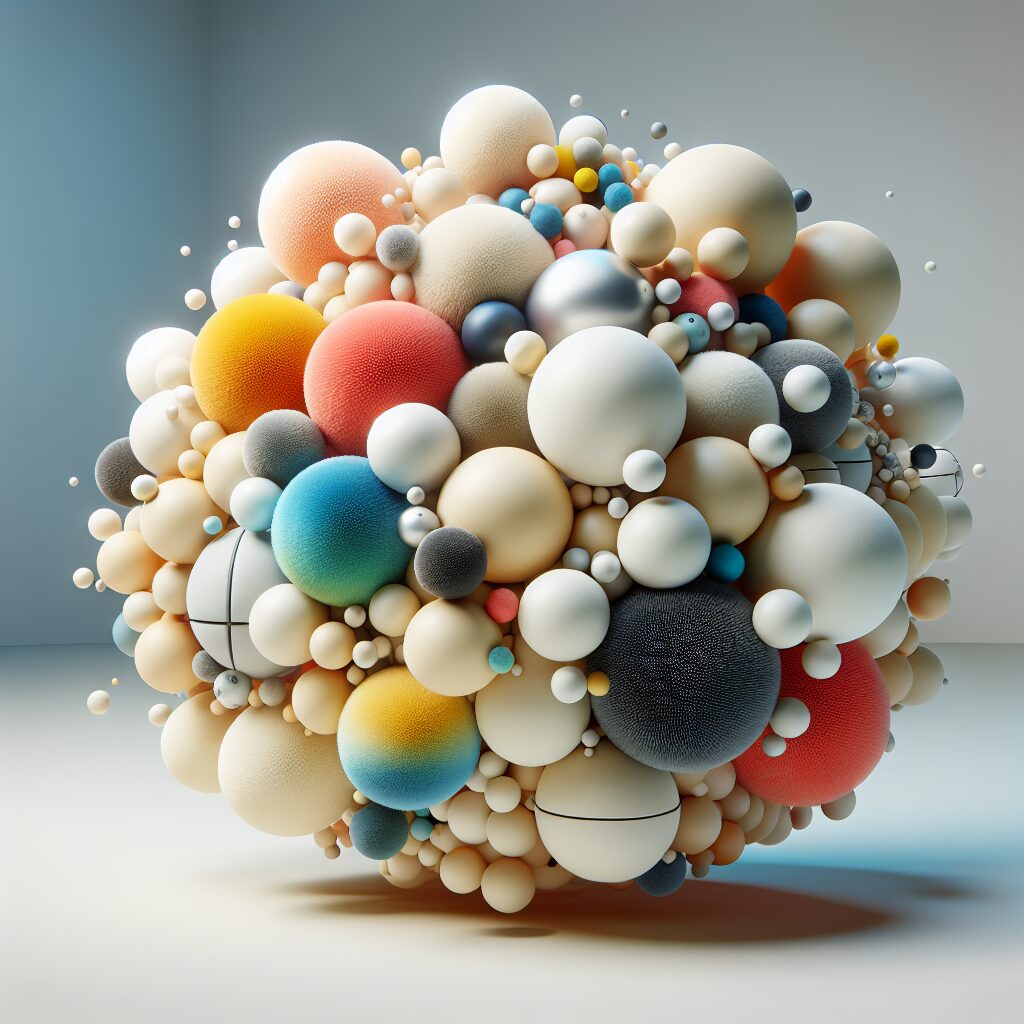Creatine is a popular dietary supplement often taken by athletes and bodybuilders to help increase their strength and muscle mass. However, there is a common belief that taking creatine can cause shrinkage in testicular size. In this article, we will discuss the scientific evidence surrounding the potential of creatine to cause shrinkage in the testicles and look at some ways to ensure that this does not happen.No, creatine does not shrink your balls. Creatine is a dietary supplement that is commonly used to help athletes and bodybuilders gain muscle mass. It does not have any known effects on the size of the testicles.
What Is Creatine?
Creatine is a natural substance found in the body, primarily in muscle cells. It is an amino acid derived from the diet, mostly from animal sources such as red meat and fish. Creatine helps to provide energy to cells by increasing ATP (adenosine triphosphate) production. ATP is the primary source of energy for muscles and other organs in the body. Creatine supplementation has become increasingly popular among athletes, bodybuilders, and people looking to improve their health and physical performance.
Creatine has been shown to increase muscle mass, strength, and power output when taken as part of a regular exercise program. It may also help reduce fatigue during exercise, allowing for longer or harder workouts. Additionally, creatine supplementation has been linked with improved cognitive function and increased energy levels. While the exact mechanisms behind these effects are not completely understood, they are thought to be related to improved cellular energy metabolism.
Creatine is considered safe and well-tolerated when taken at recommended doses for up to five years. However, people with kidney disease or diabetes should consult with their healthcare provider before taking creatine supplements as it can affect blood sugar levels and kidney function.
Side Effects of Creatine
Creatine is a popular supplement used by athletes and bodybuilders to help increase their strength and performance. While it is generally safe and effective, there are some potential side effects of creatine that you should be aware of.
The most common side effect associated with creatine is gastrointestinal distress, which can include nausea, abdominal cramps, bloating, and diarrhea. If you experience these symptoms while taking creatine, you may want to consider reducing your dosage or discontinuing use altogether.
Creatine can also cause an increase in blood pressure and cholesterol levels. If you have any pre-existing medical conditions that could be affected by these changes, it’s important to speak with your doctor before taking creatine.
In rare cases, long-term use of creatine has been linked to kidney damage. If you experience any signs of kidney problems such as decreased urination or swelling in the feet or ankles while using creatine, you should stop taking it immediately and consult your doctor.
It’s also important to note that there are no long-term studies on the safety of creatine use in children or adolescents under the age of 18. Therefore, it’s best to avoid giving creatine supplements to children unless specifically instructed by a doctor.
Finally, some people may be sensitive to ingredients in certain brands or forms of creatine supplements and may experience skin reactions such as hives or itching. If this occurs while using a particular brand or form of supplement, try switching to one with a different formulation and observe for any changes.
In conclusion, while generally safe for most healthy adults when taken as directed, there are some potential side effects associated with the use of creatine that should be taken into consideration before starting supplementation. Be sure to talk with your doctor if you have any questions or concerns about using this popular supplement.
Creatine and Testosterone
Creatine is a naturally occurring substance found in the body, primarily in muscle tissue. It is an important component of energy production and helps to support muscle growth. Creatine has been studied extensively for its effects on testosterone levels and other hormones. Research suggests that creatine supplementation may increase testosterone levels, although the exact mechanism is not yet known. Additionally, creatine has been found to have an effect on other hormones, such as growth hormone and cortisol, which may also be related to testosterone production.
The exact effects of creatine on testosterone levels vary from person to person. In general, research suggests that creatine supplementation can increase testosterone levels by up to 20% in some individuals. However, this effect may not be consistent across all individuals and more research is needed to determine the exact effects of creatine on testosterone production.
In addition to its potential effects on testosterone levels, creatine has also been studied for its potential benefits on other hormones as well. Studies have shown that creatine can increase growth hormone secretion and reduce cortisol levels. These changes may be beneficial for athletes looking to improve their performance by increasing their strength and power output, as well as reducing fatigue during intense physical activities.
Overall, research suggests that creatine supplementation can have a positive effect on both testosterone production and other hormones in the body. However, it is important to note that these effects vary from person to person and more research is needed to fully understand how creatine affects hormone production. Additionally, it is important to consult a physician prior to taking any supplements or medications related to hormone regulation or health conditions related to hormones.
Creatine and Fertility
Creatine is a natural compound found in the body and is also used as a dietary supplement. It is often used by athletes and bodybuilders to improve muscle mass and physical performance. However, there has been some concern that creatine may affect fertility in men.
The potential effects of creatine on fertility are not fully understood, but there have been some studies that suggest it may have an effect on male fertility. A study published in the journal Reproductive Biology and Endocrinology found that creatine supplementation may reduce sperm motility, which can affect a man’s ability to conceive.
Another study published in the journal Clinical Nutrition also suggested that creatine supplementation could reduce sperm count in men. However, this study was only conducted on rats, so further research is needed to determine if the same effects would be seen in humans.
It is important to note that there has not been enough research conducted on the effects of creatine on fertility in humans, so it is impossible to draw any definitive conclusions about its impact on male fertility. Additionally, most of the studies conducted so far have used animals as test subjects, which makes it difficult to generalize the results to humans.
In conclusion, more research is needed before any definitive conclusions can be made about the impact of creatine on fertility in men. Until then, it is best to consult with your doctor before taking any dietary supplements or engaging in any type of supplementation program if you are concerned about how they might affect your fertility or reproductive health.

Are There Long-Term Health Concerns With Creatine?
Creatine is a popular nutritional supplement that has been widely used to improve athletic performance, enhance strength and increase muscle mass. While it is generally considered safe, there are some potential long-term health concerns associated with its use. These include increased risk of kidney damage, kidney stones, and liver problems. Additionally, people with existing health conditions should consult their physician before taking creatine supplements.
There have been some studies that suggest that creatine supplementation may be associated with an increased risk of kidney dysfunction in some individuals. This is thought to be due to the fact that creatine is metabolized by the kidneys and can place additional strain on them. Additionally, high doses of creatine may cause an accumulation of creatinine in the blood, which can lead to dehydration and electrolyte imbalances.
Creatine supplements may also increase the risk of developing kidney stones or other urinary tract problems. This is because creatine has been found to decrease the amount of citrate in urine, which helps prevent the formation of kidney stones. Additionally, some studies have found a link between high doses of creatine supplementation and liver damage or dysfunction.
In general, most healthy adults who use creatine supplements do not experience any significant long-term health concerns as a result. However, those with existing health conditions or who take large amounts of creatine should speak to their doctor first before using it as a supplement. It is important to follow all instructions on product labels regarding dosage and use for maximum safety.
Is High Dose of Creatine Safe for Men’s Reproductive Health?
Creatine is a naturally occurring substance found in the body, mostly in skeletal muscles. It is also found in some foods, such as red meat and fish. Creatine is used by athletes to boost performance and increase muscle mass. However, its use has raised concerns about its safety for men’s reproductive health.
Studies indicate that high doses of creatine may have an adverse effect on fertility and testosterone levels in male athletes. Some studies have found that high doses of creatine may reduce sperm quality and quantity, causing a decrease in fertility. In addition, it has been suggested that creatine supplementation may increase the production of certain hormones, such as luteinizing hormone (LH), which could lead to lowered testosterone levels.
However, these results are inconclusive and further research is needed to confirm these findings. Some studies suggest that there may be no negative effects when taking creatine in the recommended dosage range (up to 5 grams per day). Other studies have not found any negative effects on fertility or testosterone levels when taking up to 10 grams per day. Therefore, more research is needed to determine the safety of higher doses of creatine for men’s reproductive health.
Overall, while there is some evidence that high doses of creatine may have an adverse effect on male fertility and testosterone levels, more research is needed before any definitive conclusions can be made. Until then, it is best to consume only the recommended dosage range (up to 5 grams per day) when supplementing with creatine.
Creatine Supplementation Impact Male Reproductive System
Creatine is an amino acid-like substance found naturally in the body and is also available in dietary supplement form. It has been used by athletes for decades to increase muscle strength and power, and more recently, creatine has been studied for its potential to influence male reproductive health. Studies have suggested that creatine supplementation may improve semen quality, lower fertility rates, and increase testosterone levels in men.
Creatine is thought to work by increasing the production of adenosine triphosphate (ATP), which is a molecule involved in energy production in cells. Studies have found that ATP levels are higher in men who take creatine supplements than those who do not, suggesting that increased ATP production may help improve sperm motility and quality.
In addition to increasing ATP levels, creatine may also act as an antioxidant, reducing oxidative damage that can impair sperm function. Oxidative stress can cause cell damage and decrease sperm count, motility, and morphology. Creatine supplementation may help reduce this oxidative damage and consequently improve semen parameters such as motility, morphology, concentration, count, and total motile sperm count (TMSC).
Studies have also suggested that creatine supplementation can increase testosterone levels in men. Testosterone plays an important role in male sexual function, including regulating libido and maintaining erectile function. Research has found that men who take creatine supplements tend to have higher levels of testosterone than those who don’t take them.
Overall, research suggests that creatine supplementation may have a beneficial effect on male reproductive health by improving semen parameters such as motility and concentration as well as increasing testosterone levels. However, more research is needed to determine whether or not these effects are consistent across all populations of men. Additionally, it is important to note that excessive intake of creatine can lead to side effects such as dehydration or gastrointestinal distress so it is important to consult with a doctor before taking any supplements.

Conclusion
Based on the available evidence, creatine does not shrink your balls. Research has shown that taking creatine supplements can bring about a wide range of health benefits, including improved muscle strength and endurance. However, it is important to note that taking too much creatine can lead to potential side effects. Therefore, it is important to consult a doctor before starting any supplements.
In conclusion, there is no scientific evidence to suggest that taking creatine will lead to any kind of reduction in testicular size. The best way to ensure one’s health and well-being is through a balanced diet and regular exercise.
Ultimately, the only thing that can be said for sure is that there is simply no scientific evidence linking creatine use with any kind of testicular shrinkage. So if you’re looking for an effective way to improve your physical performance, then you should definitely consider using creatine supplements.




